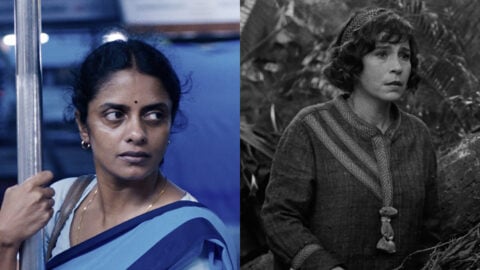Deep Focus: Black Mass
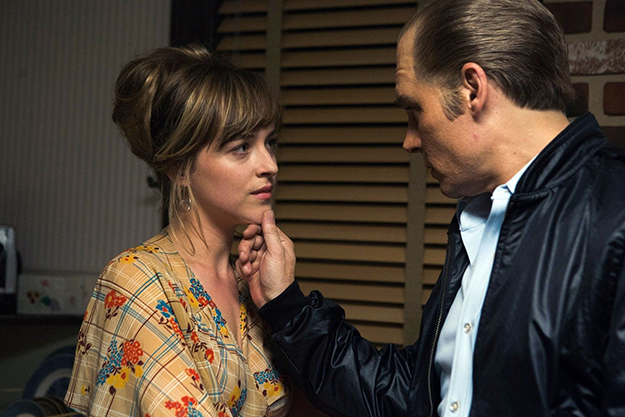
James “Whitey” Bulger mythologized himself as a South Boston neighborhood boy made good—or at least, “bad good.” Beneath that aura he reached new peaks of insolence and brutality as a ruthless crime boss. For all his Irish-American sentimentality about his ties to Southie, he controlled drug traffic on its streets while practicing extortion and working gambling and other rackets throughout his city, state, and country. His Winter Hill gang was based in Somerville, not Southie. He helped fix horse races up and down the Northeast, and he even muscled in on the jai alai craze in Florida.
Bulger’s behavior had a cunning duplicity. He eschewed ostentation, staying with his mother in Southie or with a steady girlfriend. He was self-conscious about keeping fit and looking sharp, rarely smoked and didn’t get drunk, and thought he proved his ethnic bona fides by trying to smuggle guns to the IRA. He was a sadist who murdered men and at least one woman with his bare hands. Although he liked to maintain an image of cold control, what excited him most was unleashing his vengeance in public.
The story of how Bulger, his partners and their henchmen grew in power and operated freely for decades sounds like incendiary movie material. But Scott Cooper’s Black Mass, based on the book of the same name by first-rate Boston Globe reporters Dick Lehr and Gerard O’Neill, is a misfire: like a defective hollow-point bullet, it fails to expand when it enters your brain.
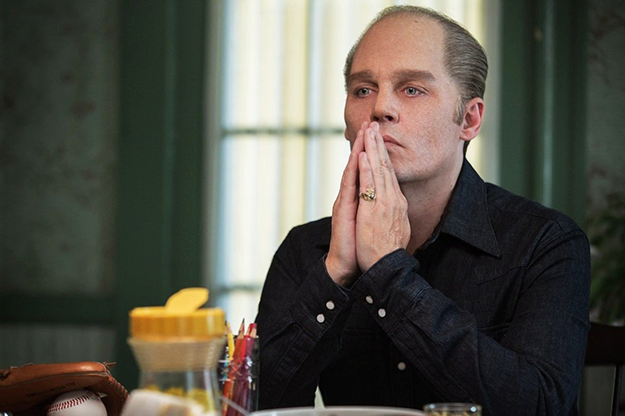
Johnny Depp, as Bulger, makes an intense and honest attempt to portray Bulger as a charismatic kingpin. But what holds you is his presence as an actor, not any revelations he mines from the character. The way screenwriters Mark Mallouk and Jez Butterworth shape the story, when we meet him, he’s fully formed—a master of all he surveys in Southie’s streets and saloons.
The film’s awkward frame is that the story unfolds from the taped confessions of Bulger’s closest associates, who tell their tales in tight close-up to a no-nonsense interrogator. First up is Kevin Weeks (Jesse Plemons), who relates how he rose from bouncer to right-hand man and evokes how intoxicating it could be for a young man to bask in Bulger’s aura of command.
I don’t think we come any closer to understanding Bulger and his impact than we do when we see him motion Weeks into his car and enlist him in the beating of a rival gang’s tubby underling. Weeks gets caught up in Bulger’s cock-sureness; the older man’s eruption of violence awakens his own. Partly because of Plemons’s rare skill at conveying dogged power and recessive thought (still best displayed on TV’s Friday Night Lights), you may hope that Cooper and his screenwriters will follow his perspective to the bitter end. Instead, the action jumps from narrator to narrator or from year to year, most of the time playing out from no one’s point of view in particular, much less the director’s.

The movie suggests that Bulger goes haywire after his only son dies of Reye syndrome at age 6 and his mother dies at age 80. But his boy died in 1973, his mom in 1980. Even when the movie collapses the chronology, the twin losses don’t register as a one-two punch, merely a half-hearted feint at pouring some feature-story “human interest” into ripped-from-the-headlines melodrama. In 1988, The Boston Globe actually broke the news that Bulger was an FBI informant. Ever since, he’s been paired in the public mind with John Connolly (Joel Edgerton), the FBI agent who was supposed to manage him but instead became his partner in crime. (He was a model for Matt Damon’s role as the law-enforcement mole for the Irish gang in The Departed, just as Jack Nicholson’s Frank Costello was partly based on Bulger.)
Cooper and company turn Connolly’s “alliance” with the crime boss into the fulcrum of the movie. Connolly, friends since childhood with Bulger and his politician brother Billy (Benedict Cumberbatch), convinces his agency cohorts that Bulger is ideally positioned to help them take down the FBI’s major target: La Cosa Nostra. At the same time he persuades Bulger that the FBI will serve as his protection just as paid-off cops function as the Mafia’s. As long as Bulger enables him to topple New England’s Italian-American crime hierarchy, the agent will make sure the FBI looks the other way as Bulger’s gang takes control of Boston’s underworld. Connolly’s one caveat: don’t kill anyone. As soon as their operation starts up, it becomes clear to almost everyone, including Connolly’s wife (Julianne Nicholson), that this FBI man isn’t running Bulger, he’s fulfilling a childhood dream of teaming up with the toughest guy on the block. And Bulger takes their deal as a license to kill with impunity.
The characters are so smoothed-out and one-dimensional that they don’t set off any sparks as they skid crazily across the narrow, twisting mean streets of South Boston. Connolly tells his wife: “Like it or not, Marianne, you married a street kid. And the streets taught me that you give and you get loyalty from your friends, and loyalty means a lot to me.” That explanation is supposed to pair up with Weeks’s earlier declaration: “The truth is, we Irish Southie kids went straight from playing cops and robbers on the playground to doing it for real on the streets. And just like on the playground, it wasn’t easy to tell which was which.”
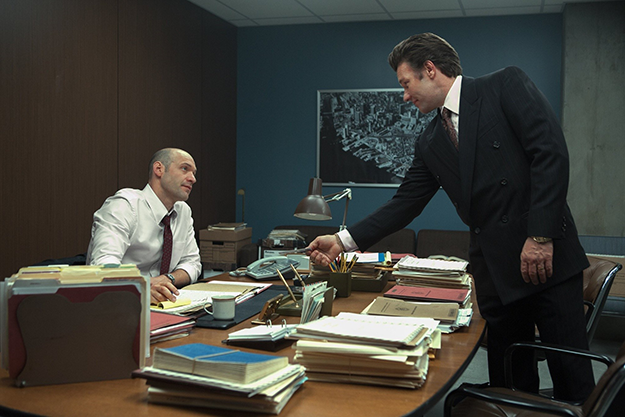
But this film fails to dramatize the pull of childhood and tribal allegiances, so all the speechifying falls flat, and the historical reconstruction feels uninhabited. It reminded me of what Pauline Kael said about the “Boston Irish world” in the movie version of George V. Higgins’s great crime novel, The Friends of Eddie Coyle: “The picture was shallow and tedious, because although we could see how the gangsters victimized each other, the police and the gangsters had no roots—and intertwined roots were what it was meant to be about. It was a milieu picture without milieu.”
In Black Mass, that vacancy reduces Connolly to a fatuous rogue agent and Billy Bulger—president of the Massachusetts State Senate for 18 years—into a cipher. You can feel Edgerton and Cumberbatch fishing for deeper nuances than “star-struck lawman” or “political genius in denial,” but even these talents (and Kevin Bacon, Corey Stoll, and so many others) come up empty.
A couple of actors break through the shallows, notably Peter Sarsgaard, who merges hysteria and volatility as Brian Halloran, a Winter Hill gang member who was executed in a restaurant parking lot for trying to inform on Bulger. The writing and staging of that scene is at once so barbarous and opaque, you may not realize that the man killed alongside Halloran is a totally innocent civilian. One of the many virtues of Joe Berlinger’s splendid, illuminating documentary, Whitey: United States of America v. James J. Bulger, is the straight-talking rapport he establishes with Bulger’s victims, including the widow of Michael Donahue, that murdered bystander. Although he could not take cameras into the courtroom, Berlinger captures its bristling atmosphere with transcripts and news footage as well as fresh interviews with witnesses and victims’ families, testimonies from reporters who’d been covering Bulger’s misdeeds for decades, and, astoundingly, Bulger’s jailhouse phone calls to his defense team, which reveal more of this criminal’s shrewdness than all the tough-guy putdowns in Black Mass.
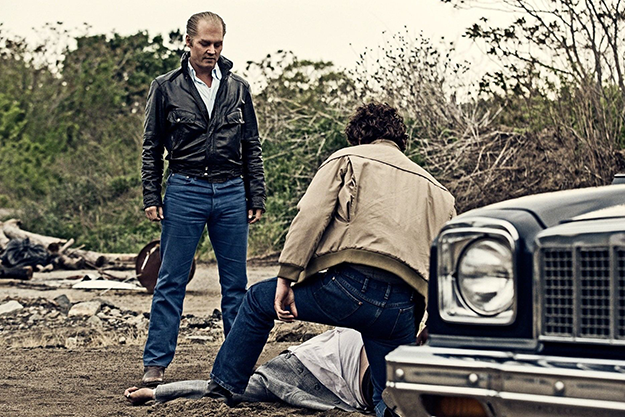
Even Depp’s performance works only as spectacle. His blue contact lenses reduce each pupil to a pinpoint; a prosthetic does the same to the tip of his nose. In a sense, he’s almost as stylized as Edward Scissorhands. He’s got push-button fury: he goes from cool manipulation to ferocity in a nanosecond.
Black Mass is as elusive as its title. It wants to make us feel that in a parish like Southie, gutter camaraderie can have as potent a hold as the Catholic Church. But the movie doesn’t flesh out its highlighted themes of loyalty and fraternity, so Depp’s vehemence and magnetism seem less than human, or maybe other than human.
It does make some sense, then, that Connolly’s wife is reading The Exorcist when Bulger comes knocking on her door and comes on as a Satanic seducer. She wonders why her proud FBI husband has gone so speedily downhill. You feel like telling her the Devil made him do it.





